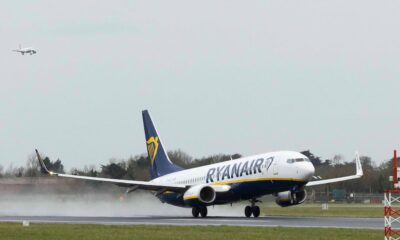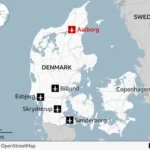Business
Co-op says cyber-attack cost it £206m in lost sales
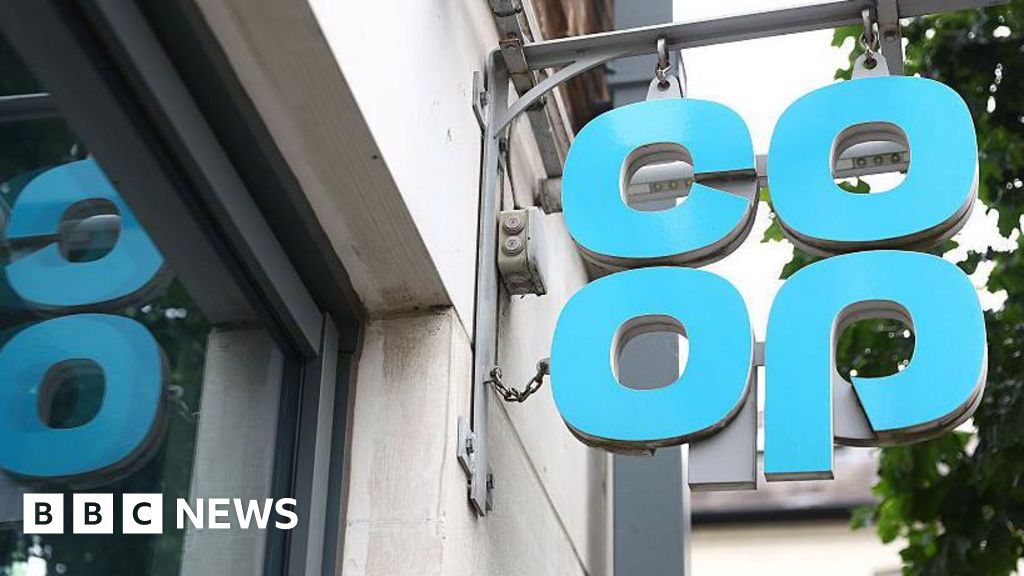
Read more on post.
The Co-op has said the cyber-attack it suffered earlier this year cost it at least £206m in lost revenues.
The retailer’s IT networks were infiltrated by hackers in April, resulted in payment problems, widespread shortages of goods in shops, and the loss of customer data.
Co-op chair Debbie White said the “malicious” attack had caused “significant challenges” in the first half of 2025.
Overall, the retailer reported a £75m underlying pre-tax loss in the six months to 5 July, compared to a £3m profit in the same period a year earlier.
It also said profits were hit by increased staffing costs and regulations, as well as the cyber-attack.
The full cost of the attack could be much higher as the Co-op said it was also expecting there to be some impact to its business in the second half of the year.
Ms White said the group must now rebuild “better and stronger to meet the challenges and opportunities that lie ahead”.
Co-op reported its total group revenue – the amount of money a company makes from all its business activities – was £5.48bn.
That’s a decrease from the £5.6bn it reported as total group revenue for the same period in 2024.
April’s cyber-attack resulted in empty store shelves and issues with digital payments. The disruption was particularly felt in some rural areas where the local Co-op is the only large supermarket.
After initially downplaying the attack, the Co-op later admitted all 6.5 million of its member customers had their data stolen.
The business’s funeral homes also had to resort to paper-based systems.
Co-op chief executive Shirine Khoury-Haq said she was proud of how the business had responded to the attack and that it highlighted many “strengths”.
“It also highlighted areas we need to focus on – particularly in our Food business,” she said.
The attack on the Co-op came amid a challenging period for the group, as it faces rising costs and and pressure on consumer confidence from the rising cost of living.
Last year, the company reported improved profits but warned in April it would face more than £200m in costs and spending pressures in 2025, including £80m from the impact of shoplifting.
Marks & Spencer and Harrods were both hit by cyber-attacks around the same time, but the Co-op was able to resume normal trading at a faster pace as it discovered the attack earlier.
Marks & Spencer, which stopped all online sales for six weeks following its hack, said it faced a £300m financial hit.
Speaking exclusively to the BBC, hackers who claimed to be responsible for the Co-op cyber-attack said they breached the company’s computer systems long before they were discovered.
But the attackers also said that the Co-op disconnected the internet from IT networks in the nick of time to stop the hackers from deploying ransomware and causing even more disruption.
At the end of August, carmaker Jaguar Land Rover (JLR) also suffered a cyber-attack and the company was forced to shut down its IT networks.
Production at its factories in the UK was also shutdown as a result, and will remain suspended until October at the earliest affecting suppliers as well as factory workers.
Business
Nicolas Sarkozy sentenced to five years in Libya campaign financing case

This post was originally published on this site.
Former French President Nicolas Sarkozy has been sentenced to five years in jail after being found guilty of criminal conspiracy in a case related to millions of euros of illicit funds from the late Libyan leader Col Muammar Gaddafi.
The Paris criminal court acquitted him of all other charges, including passive corruption and illegal campaign financing.
Sarkozy, who claims the case is politically motivated, was accused of using the funds from Gaddafi to finance his 2007 election campaign.
In exchange, the prosecution alleged Sarkozy promised to help Gaddafi combat his reputation as a pariah with Western countries.
Sarkozy, 70, was the president of France from 2007 to 2012.
Judge Nathalie Gavarino said Sarkozy had allowed close aides to contact Libyan officials with a view to obtaining financial support for his campaign.
But the court ruled that there was not enough evidence to find Sarkozy was the beneficiary of the illegal campaign financing.
He was sentenced to five years in jail. The ruling means he will spend time in jail even if he appeals.
He was also ordered to pay a fine of 100,000 euros (£87,000).
There was a shocked intake of breath in court when the judge read out her sentence.
Sarkozy could be sent to prison in Paris in the coming days – a first for a former French president and a humiliating blow for a man who has always protested his innocence in this trial and the other legal cases against him.
The investigation was opened in 2013, two years after Saif al-Islam, son of the then-Libyan leader, first accused Sarkozy of taking millions of his father’s money for campaign funding.
The following year, Lebanese businessman Ziad Takieddine – who for a long time acted as a middleman between France and the Middle East – said he had written proof that Sarkozy’s campaign bid was “abundantly” financed by Tripoli, and that the €50m (£43m) worth of payments continued after he became president.
Among the others accused in the trial were former interior ministers, Claude Gueant and Brice Hortefeux. The court found Gueant guilty of corruption, among other charges, and Hortefeux was found guilty of criminal conspiracy.
Sarkozy’s wife, Italian-born former supermodel and singer Carla Bruni-Sarkozy, was charged last year with hiding evidence linked to the Gaddafi case and associating with wrongdoers to commit fraud, both of which she denies.
Since losing his re-election bid in 2012, Sarkozy has been targeted by several criminal investigations.
He also appealed against a February 2024 ruling which found him guilty of overspending on his 2012 re-election campaign, then hiring a PR firm to cover it up. He was handed a one-year sentence, of which six months were suspended.
In 2021, he was found guilty of trying to bribe a judge in 2014 and became the first former French president to get a custodial sentence. In December, the Paris appeals court ruled that he could serve his time at home wearing a tag instead of going to jail.
Business
Denmark says ‘professional actor’ behind drone incursions over its airports
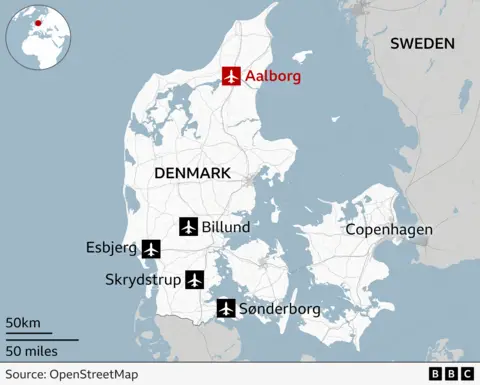
Read full article on post.
Aleks Phillips and
Adrienne Murray
Denmark says drones flown over its airports appear to be the work of a “professional actor” but there was no evidence of Russian involvement, after such activity disrupted its airspace for the second time in a week.
Aalborg airport was forced to shut down for several hours on Wednesday evening after green lights were spotted overhead, while Billund airport also briefly closed. Three smaller airports also reported drone activity.
On Monday, Copenhagen airport temporarily closed due to a drone incursion.
Defence Minister Troels Lund Poulsen told a news conference that the “hybrid attack” was part of a “systematic operation”, but said the devices had been launched locally.
A hybrid attack uses a mix of military and non-military tactics and is designed to interfere with a nation’s infrastructure or institutions.
Drones pose a risk of colliding with planes, particularly during take-off or landing, but halting air traffic in and out of an airport to avoid this can cause delays and flights being redirected elsewhere.
At least three flights were diverted away from Aalborg during the incident.
All the airports affected by the overnight incident sit on Jutland, the part of Denmark that is on the European mainland.
Drones were first sighted over the northerly Aalborg airport around 21:44 local time (19:44 GMT), state media reports. A few minutes later, police received reports of drone activity near small, southerly airports in Esbjerg, Sønderborg and Skrydstrup.
Possible drone activity over Billund prompted the closure of its airport for about an hour early on Thursday morning.
The drones were assessed to have cleared shortly before 03:00 and the airspace was reopened. Danish police are now seeking to find out who launched them.
Poulsen said there was no evidence to suggest Russia was behind the incursion. The Russian embassy in Copenhagen has denied “absurd speculations” of its involvement.
It described the incidents as “staged provocations”, saying they would be used “as a pretext for further escalating tension” over the war in Ukraine.
Russia has been accused of conducting hybrid attacks in the past, and Europe has been on high alert after several Nato member states reported Russian incursions in their airspaces.
Estonia and Poland requested a consultation with other Nato members last week, after around 20 Russian drones crossed into Poland and Russian MiG31 jets entered Estonian airspace in a separate incident. Romania, another Nato member, also said a Russian drone had breached its airspace.
Russia denied violating Estonia’s airspace, while it insisted the Polish incursion was not deliberate. It did not comment on the incident in Romania.
Suspicious drones have also been sighted over Germany and Sweden. All are suspected – but not proven – to be part of Russia’s indirect aggression towards Nato states supporting Ukraine.
Danish Prime Minister Mette Frederiksen said Russian involvement in the Copenhagen drone incursion could not be ruled out, describing it as “the most severe attack on Danish infrastructure so far”. The incident also saw Oslo airport in Norway temporarily close.
Kremlin spokesman Dmitry Peskov called the allegations “unfounded”.
Officials said the Danish Armed Forces had been affected by Wednesday’s incident, as Aalborg airport is also used as a military base. Skrydstrup is also home to an airbase.
The drones were not shot down, despite Danish authorities saying they had the ability to do so. Officials said this was due to concerns for the safety of the surrounding population.
“If we get the opportunity, we will take down the drones,” chief inspector Jesper Bøjgaard Madsen said.
Police said they did not believe the drones posed any danger to people at the airport or nearby residents, but asked the public to keep their distance from the area.
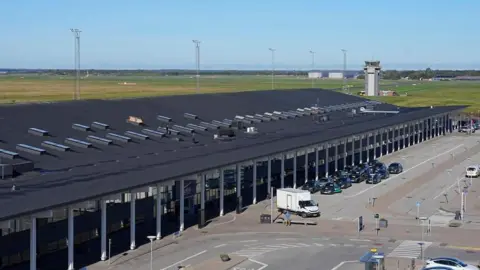 EPA
EPAPeter Hummelgaard, Denmark’s justice minister, said the hybrid threats were “here to stay”.
Poulsen noted that an EU meeting had been called for Friday, at which enhanced drone preparedness across Europe would be discussed.
Earlier this month, European Commission President Ursula von der Leyen called for a “drone wall” to tackle incursions launched by Russia.
What that means is not entirely clear – but detecting the drones early and then destroying them are seen as key elements of such a strategy.
US President Donald Trump has gone as far as to say that Nato nations should shoot down Russian planes in their airspace, while Nato has warned it would use “all necessary military and non-military tools” to defend itself following the recent military incursions.
“We are a defensive alliance, yes, but we are not naive, so we see what is happening,” Nato’s secretary general Mark Rutte said.
Business
Starmer to announce more cash for neglected areas
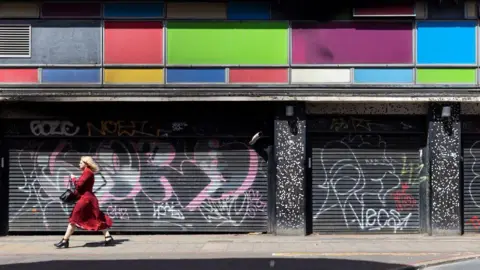
Read full article on post.
Sir Keir Starmer is to announce extra funding for more than 330 “overlooked” communities across the UK to boost struggling High Streets.
Details of the investment, including the amount of money and where it will be spent, will be set out later on Thursday.
Under its Pride in Place programme, the government also wants to encourage councils to block “fake” barbers and betting and vape shops – as well as giving communities more help to save pubs and libraries from closure.
Housing, Communities and Local Government Secretary Steve Reed said the government was “putting power” into the hands of local people but the Conservatives said the money would be “dwarfed” by tax rises.
The announcement is part of Labour’s attempt to tackle the electoral threat posed to them by the rising popularity of Reform UK, which some in government believe is partly driven by a loss of pride in local areas.
The investment for the more than 330 communities would be targeted at improvements backed by the local community and could include projects to tackle littering and graffiti or building a new sports ground.
The government says spending would only be approved if community groups, local organisations and social clubs have been involved in deciding how the money will be spent.
Unlike the levelling up funding scheme introduced under Boris Johnson’s Conservative government, councils would not put in bids to get the money, with the locations being decided by the government.
In addition to the money, councils in England and Wales will be encouraged to use powers to buy up “assets and eyesores” such as boarded-up shops and derelict abandoned businesses, allowing them to be used for projects such as local start-ups.
Disused department stores or empty office blocks could be repurposed into new health centres or housing, the government has suggested.
Communities already have a “right to buy”, making it simpler for them to acquire local assets such as village shops, pubs or children’s centres.
Under its devolution bill, currently going through Parliament, the government is doubling the amount of time local groups have to raise the money to make a purchase from six months to 12.
It also wants to include sports grounds in the list of assets covered by the new community “right to buy”.
As part of the Pride in Place programme, the government says it wants to encourage councils to block unwanted new betting and vaping shops, along with “fake” barbers.
A government source told the BBC: “At the moment, the Tobacco and Vapes Bill already allows vape stores to be blocked.
“We want to potentially extend that to betting shops and fake barbers on high streets and we are looking for a legislative vehicle to do that as soon as possible.”
Announcing the plan, Steve Reed said: “When people step out of their front doors, they know their communities are struggling. They see shuttered pubs, fading high streets and their local areas in decline.
“The government is putting power into their hands so local people decide how best to restore pride in their neighbourhoods, not us in Westminster.
“That’s what real patriotism looks like: building up our communities and choosing renewal over division.”
Conservative shadow communities secretary, Sir James Cleverly, said “Labour have been forced into this announcement to try to distract from the immense damage they are doing to businesses and communities by hiking taxes.”
He said the investment would be “dwarfed by Rachel Reeves’ £2.7bn in annual business rates hike, leaving communities worse off and prices higher”.
A spokesperson for the Betting and Gaming Council (BGC) said the shops “are far more than just places to have a flutter: they are community hubs, economic drivers, and a vital part of the high street’s future”.
Jamie Strachan, operations director at The Vaping Specialist, said: “We are concerned by suggestions that specialist vape stores could be unfairly grouped alongside “unwanted” businesses.
“Vape stores like ours play a vital role in public health by helping millions of adults move away from smoking, the UK’s leading cause of preventable death.”
-
Culture2 days ago
Taylor Swift’s new cinema outing generates more than €12million in just 24 hours
-
Politics2 days ago
European Parliament snubs Orbán with vote to shield Italian MEP from Hungarian arrest
-
Culture2 days ago
Milan Fashion Week 2025: Unmissable shows and Giorgio Armani in mind
-
Health3 days ago
EU renews support for WHO’s Universal Health Coverage Partnership
-
Opinion2 days ago
AI Is Pointless If It Doesn’t Boost Productivity
-
Environment1 week ago
Chimps drinking a lager a day in ripe fruit, study finds
-
Environment2 days ago
Nasa plans first crewed Moon mission in 50 years for February 2026
-
Culture2 days ago
From Koniaków to Paris: how traditional Polish crocheting is captivating high fashion
Business
Co-op says cyber-attack cost it £206m in lost sales

Read more on post.
The Co-op has said the cyber-attack it suffered earlier this year cost it at least £206m in lost revenues.
The retailer’s IT networks were infiltrated by hackers in April, resulted in payment problems, widespread shortages of goods in shops, and the loss of customer data.
Co-op chair Debbie White said the “malicious” attack had caused “significant challenges” in the first half of 2025.
Overall, the retailer reported a £75m underlying pre-tax loss in the six months to 5 July, compared to a £3m profit in the same period a year earlier.
It also said profits were hit by increased staffing costs and regulations, as well as the cyber-attack.
The full cost of the attack could be much higher as the Co-op said it was also expecting there to be some impact to its business in the second half of the year.
Ms White said the group must now rebuild “better and stronger to meet the challenges and opportunities that lie ahead”.
Co-op reported its total group revenue – the amount of money a company makes from all its business activities – was £5.48bn.
That’s a decrease from the £5.6bn it reported as total group revenue for the same period in 2024.
April’s cyber-attack resulted in empty store shelves and issues with digital payments. The disruption was particularly felt in some rural areas where the local Co-op is the only large supermarket.
After initially downplaying the attack, the Co-op later admitted all 6.5 million of its member customers had their data stolen.
The business’s funeral homes also had to resort to paper-based systems.
Co-op chief executive Shirine Khoury-Haq said she was proud of how the business had responded to the attack and that it highlighted many “strengths”.
“It also highlighted areas we need to focus on – particularly in our Food business,” she said.
The attack on the Co-op came amid a challenging period for the group, as it faces rising costs and and pressure on consumer confidence from the rising cost of living.
Last year, the company reported improved profits but warned in April it would face more than £200m in costs and spending pressures in 2025, including £80m from the impact of shoplifting.
Marks & Spencer and Harrods were both hit by cyber-attacks around the same time, but the Co-op was able to resume normal trading at a faster pace as it discovered the attack earlier.
Marks & Spencer, which stopped all online sales for six weeks following its hack, said it faced a £300m financial hit.
Speaking exclusively to the BBC, hackers who claimed to be responsible for the Co-op cyber-attack said they breached the company’s computer systems long before they were discovered.
But the attackers also said that the Co-op disconnected the internet from IT networks in the nick of time to stop the hackers from deploying ransomware and causing even more disruption.
At the end of August, carmaker Jaguar Land Rover (JLR) also suffered a cyber-attack and the company was forced to shut down its IT networks.
Production at its factories in the UK was also shutdown as a result, and will remain suspended until October at the earliest affecting suppliers as well as factory workers.
Business
Nicolas Sarkozy sentenced to five years in Libya campaign financing case

This post was originally published on this site.
Former French President Nicolas Sarkozy has been sentenced to five years in jail after being found guilty of criminal conspiracy in a case related to millions of euros of illicit funds from the late Libyan leader Col Muammar Gaddafi.
The Paris criminal court acquitted him of all other charges, including passive corruption and illegal campaign financing.
Sarkozy, who claims the case is politically motivated, was accused of using the funds from Gaddafi to finance his 2007 election campaign.
In exchange, the prosecution alleged Sarkozy promised to help Gaddafi combat his reputation as a pariah with Western countries.
Sarkozy, 70, was the president of France from 2007 to 2012.
Judge Nathalie Gavarino said Sarkozy had allowed close aides to contact Libyan officials with a view to obtaining financial support for his campaign.
But the court ruled that there was not enough evidence to find Sarkozy was the beneficiary of the illegal campaign financing.
He was sentenced to five years in jail. The ruling means he will spend time in jail even if he appeals.
He was also ordered to pay a fine of 100,000 euros (£87,000).
There was a shocked intake of breath in court when the judge read out her sentence.
Sarkozy could be sent to prison in Paris in the coming days – a first for a former French president and a humiliating blow for a man who has always protested his innocence in this trial and the other legal cases against him.
The investigation was opened in 2013, two years after Saif al-Islam, son of the then-Libyan leader, first accused Sarkozy of taking millions of his father’s money for campaign funding.
The following year, Lebanese businessman Ziad Takieddine – who for a long time acted as a middleman between France and the Middle East – said he had written proof that Sarkozy’s campaign bid was “abundantly” financed by Tripoli, and that the €50m (£43m) worth of payments continued after he became president.
Among the others accused in the trial were former interior ministers, Claude Gueant and Brice Hortefeux. The court found Gueant guilty of corruption, among other charges, and Hortefeux was found guilty of criminal conspiracy.
Sarkozy’s wife, Italian-born former supermodel and singer Carla Bruni-Sarkozy, was charged last year with hiding evidence linked to the Gaddafi case and associating with wrongdoers to commit fraud, both of which she denies.
Since losing his re-election bid in 2012, Sarkozy has been targeted by several criminal investigations.
He also appealed against a February 2024 ruling which found him guilty of overspending on his 2012 re-election campaign, then hiring a PR firm to cover it up. He was handed a one-year sentence, of which six months were suspended.
In 2021, he was found guilty of trying to bribe a judge in 2014 and became the first former French president to get a custodial sentence. In December, the Paris appeals court ruled that he could serve his time at home wearing a tag instead of going to jail.
Business
Denmark says ‘professional actor’ behind drone incursions over its airports

Read full article on post.
Aleks Phillips and
Adrienne Murray
Denmark says drones flown over its airports appear to be the work of a “professional actor” but there was no evidence of Russian involvement, after such activity disrupted its airspace for the second time in a week.
Aalborg airport was forced to shut down for several hours on Wednesday evening after green lights were spotted overhead, while Billund airport also briefly closed. Three smaller airports also reported drone activity.
On Monday, Copenhagen airport temporarily closed due to a drone incursion.
Defence Minister Troels Lund Poulsen told a news conference that the “hybrid attack” was part of a “systematic operation”, but said the devices had been launched locally.
A hybrid attack uses a mix of military and non-military tactics and is designed to interfere with a nation’s infrastructure or institutions.
Drones pose a risk of colliding with planes, particularly during take-off or landing, but halting air traffic in and out of an airport to avoid this can cause delays and flights being redirected elsewhere.
At least three flights were diverted away from Aalborg during the incident.
All the airports affected by the overnight incident sit on Jutland, the part of Denmark that is on the European mainland.
Drones were first sighted over the northerly Aalborg airport around 21:44 local time (19:44 GMT), state media reports. A few minutes later, police received reports of drone activity near small, southerly airports in Esbjerg, Sønderborg and Skrydstrup.
Possible drone activity over Billund prompted the closure of its airport for about an hour early on Thursday morning.
The drones were assessed to have cleared shortly before 03:00 and the airspace was reopened. Danish police are now seeking to find out who launched them.
Poulsen said there was no evidence to suggest Russia was behind the incursion. The Russian embassy in Copenhagen has denied “absurd speculations” of its involvement.
It described the incidents as “staged provocations”, saying they would be used “as a pretext for further escalating tension” over the war in Ukraine.
Russia has been accused of conducting hybrid attacks in the past, and Europe has been on high alert after several Nato member states reported Russian incursions in their airspaces.
Estonia and Poland requested a consultation with other Nato members last week, after around 20 Russian drones crossed into Poland and Russian MiG31 jets entered Estonian airspace in a separate incident. Romania, another Nato member, also said a Russian drone had breached its airspace.
Russia denied violating Estonia’s airspace, while it insisted the Polish incursion was not deliberate. It did not comment on the incident in Romania.
Suspicious drones have also been sighted over Germany and Sweden. All are suspected – but not proven – to be part of Russia’s indirect aggression towards Nato states supporting Ukraine.
Danish Prime Minister Mette Frederiksen said Russian involvement in the Copenhagen drone incursion could not be ruled out, describing it as “the most severe attack on Danish infrastructure so far”. The incident also saw Oslo airport in Norway temporarily close.
Kremlin spokesman Dmitry Peskov called the allegations “unfounded”.
Officials said the Danish Armed Forces had been affected by Wednesday’s incident, as Aalborg airport is also used as a military base. Skrydstrup is also home to an airbase.
The drones were not shot down, despite Danish authorities saying they had the ability to do so. Officials said this was due to concerns for the safety of the surrounding population.
“If we get the opportunity, we will take down the drones,” chief inspector Jesper Bøjgaard Madsen said.
Police said they did not believe the drones posed any danger to people at the airport or nearby residents, but asked the public to keep their distance from the area.
 EPA
EPAPeter Hummelgaard, Denmark’s justice minister, said the hybrid threats were “here to stay”.
Poulsen noted that an EU meeting had been called for Friday, at which enhanced drone preparedness across Europe would be discussed.
Earlier this month, European Commission President Ursula von der Leyen called for a “drone wall” to tackle incursions launched by Russia.
What that means is not entirely clear – but detecting the drones early and then destroying them are seen as key elements of such a strategy.
US President Donald Trump has gone as far as to say that Nato nations should shoot down Russian planes in their airspace, while Nato has warned it would use “all necessary military and non-military tools” to defend itself following the recent military incursions.
“We are a defensive alliance, yes, but we are not naive, so we see what is happening,” Nato’s secretary general Mark Rutte said.
Business
Starmer to announce more cash for neglected areas

Read full article on post.
Sir Keir Starmer is to announce extra funding for more than 330 “overlooked” communities across the UK to boost struggling High Streets.
Details of the investment, including the amount of money and where it will be spent, will be set out later on Thursday.
Under its Pride in Place programme, the government also wants to encourage councils to block “fake” barbers and betting and vape shops – as well as giving communities more help to save pubs and libraries from closure.
Housing, Communities and Local Government Secretary Steve Reed said the government was “putting power” into the hands of local people but the Conservatives said the money would be “dwarfed” by tax rises.
The announcement is part of Labour’s attempt to tackle the electoral threat posed to them by the rising popularity of Reform UK, which some in government believe is partly driven by a loss of pride in local areas.
The investment for the more than 330 communities would be targeted at improvements backed by the local community and could include projects to tackle littering and graffiti or building a new sports ground.
The government says spending would only be approved if community groups, local organisations and social clubs have been involved in deciding how the money will be spent.
Unlike the levelling up funding scheme introduced under Boris Johnson’s Conservative government, councils would not put in bids to get the money, with the locations being decided by the government.
In addition to the money, councils in England and Wales will be encouraged to use powers to buy up “assets and eyesores” such as boarded-up shops and derelict abandoned businesses, allowing them to be used for projects such as local start-ups.
Disused department stores or empty office blocks could be repurposed into new health centres or housing, the government has suggested.
Communities already have a “right to buy”, making it simpler for them to acquire local assets such as village shops, pubs or children’s centres.
Under its devolution bill, currently going through Parliament, the government is doubling the amount of time local groups have to raise the money to make a purchase from six months to 12.
It also wants to include sports grounds in the list of assets covered by the new community “right to buy”.
As part of the Pride in Place programme, the government says it wants to encourage councils to block unwanted new betting and vaping shops, along with “fake” barbers.
A government source told the BBC: “At the moment, the Tobacco and Vapes Bill already allows vape stores to be blocked.
“We want to potentially extend that to betting shops and fake barbers on high streets and we are looking for a legislative vehicle to do that as soon as possible.”
Announcing the plan, Steve Reed said: “When people step out of their front doors, they know their communities are struggling. They see shuttered pubs, fading high streets and their local areas in decline.
“The government is putting power into their hands so local people decide how best to restore pride in their neighbourhoods, not us in Westminster.
“That’s what real patriotism looks like: building up our communities and choosing renewal over division.”
Conservative shadow communities secretary, Sir James Cleverly, said “Labour have been forced into this announcement to try to distract from the immense damage they are doing to businesses and communities by hiking taxes.”
He said the investment would be “dwarfed by Rachel Reeves’ £2.7bn in annual business rates hike, leaving communities worse off and prices higher”.
A spokesperson for the Betting and Gaming Council (BGC) said the shops “are far more than just places to have a flutter: they are community hubs, economic drivers, and a vital part of the high street’s future”.
Jamie Strachan, operations director at The Vaping Specialist, said: “We are concerned by suggestions that specialist vape stores could be unfairly grouped alongside “unwanted” businesses.
“Vape stores like ours play a vital role in public health by helping millions of adults move away from smoking, the UK’s leading cause of preventable death.”
-
Culture2 days ago
Taylor Swift’s new cinema outing generates more than €12million in just 24 hours
-
Politics2 days ago
European Parliament snubs Orbán with vote to shield Italian MEP from Hungarian arrest
-
Culture2 days ago
Milan Fashion Week 2025: Unmissable shows and Giorgio Armani in mind
-
Health3 days ago
EU renews support for WHO’s Universal Health Coverage Partnership
-
Opinion2 days ago
AI Is Pointless If It Doesn’t Boost Productivity
-
Environment1 week ago
Chimps drinking a lager a day in ripe fruit, study finds
-
Environment2 days ago
Nasa plans first crewed Moon mission in 50 years for February 2026
-
Culture2 days ago
From Koniaków to Paris: how traditional Polish crocheting is captivating high fashion






